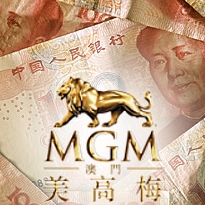 After splashing out $161.4m in October for a 7.2 hectare (17.8 acre) plot of land on Macau’s Cotai Strip, MGM China has received the official nod from regulators to build its second Macau resort casino. While the project still requires the odd bit of paperwork before MGM can start moving earth, the publication of the news in Macau’s official gazette starts the clock ticking on MGM’s plans to open its new $2.5b facility by 2016. MGM China, a co-venture between MGM Resorts International and Macau gaming figure Pansy Ho, has previously stated the project will encompass 1,600 hotel rooms, 500 gaming tables and 2,500 slot machines. MGM’s initial Cotai lease is good for 25 years, and will require MGM to pay annual rent of MOP 2.15m (US $270k). Shares of MGM China are up almost 11% at the time this was written, although MGM Resorts stock closed down nearly half a percent on Wednesday.
After splashing out $161.4m in October for a 7.2 hectare (17.8 acre) plot of land on Macau’s Cotai Strip, MGM China has received the official nod from regulators to build its second Macau resort casino. While the project still requires the odd bit of paperwork before MGM can start moving earth, the publication of the news in Macau’s official gazette starts the clock ticking on MGM’s plans to open its new $2.5b facility by 2016. MGM China, a co-venture between MGM Resorts International and Macau gaming figure Pansy Ho, has previously stated the project will encompass 1,600 hotel rooms, 500 gaming tables and 2,500 slot machines. MGM’s initial Cotai lease is good for 25 years, and will require MGM to pay annual rent of MOP 2.15m (US $270k). Shares of MGM China are up almost 11% at the time this was written, although MGM Resorts stock closed down nearly half a percent on Wednesday.
Analysts are already predicting great things for Macau’s casino biz in 2013, but Sterne Agee has gone on record with a prediction that December’s monthly revenue record of MOP 28.2b ($3.53b) might be eclipsed as early as this month. Sterne’s David Bain based his prediction on the gross gaming revenue (GGR) at gaming tables during the first six days of January, which amounted to MOP 5.5b ($689m). Add in slots revenue and Bain figures January GGR could rise 18% year-on-year and top MOP 29.5b ($3.69b). Bank of America Merrill Lynch joined the chorus of those upping their 2013 forecasts, raising expected GGR growth to 10.4% from 8.2%.
Bain suggested improved transportation infrastructure – such as the recent opening of the Gongbei station on the Guangzhou-Zhuhai high-speed rail link – deserved much of the credit for boosting Macau’s bottom line. Year-end stats from Macau International Airport showed an 11% rise in passengers to 4.49m and an 8% rise in the number of flights to 41,997. The Macau Daily Times reported that five new airlines – Mandarin Airlines, Vietnam Airlines, Thai Smile, Air Busan and Air Asia Philippines – added Macau to their flight patterns in 2012. The Southeast Asia market accounted for the lion’s share (37%) of arrivals, with mainland China at 32% and Taiwan at 31%. The airport has plans to open up its runways to carriers from India and other regions in future.
Bucking the consensus, online magazine Week in China suggests Macau’s boom is less the result of easier access and more a harbinger of a deepening malaise among China’s wealthy. The theory is, China’s rich are increasingly pessimistic about their country’s financial fortunes, so they’re using Macau to export their money before they themselves emigrate. To bolster this theory, the New York Times cited Organization for Economic Cooperation and Development statistics showing the number of Chinese emigrants had risen 45% between 2000 and 2010.
While China’s 1% may or may not be fretting about the safety of their bankroll, Macau’s casino workers are continuing to fret about the effects of the city’s new smoking ban. The Association for the Promotion of Casino Workers Rights has submitted a petition to the Labor Affairs Bureau seeking to amend the ban to prevent casinos from concentrating the most popular gaming tables in the smoking areas. The Bureau responded on Monday by revising the rules slightly, exempting (a) female dealers who were more than three months pregnant and (b) any worker suffering from heart and lung disease from being forced to work in the smoking area. The workers are also seeking a timetable for the imposition of a total ban on smoking.